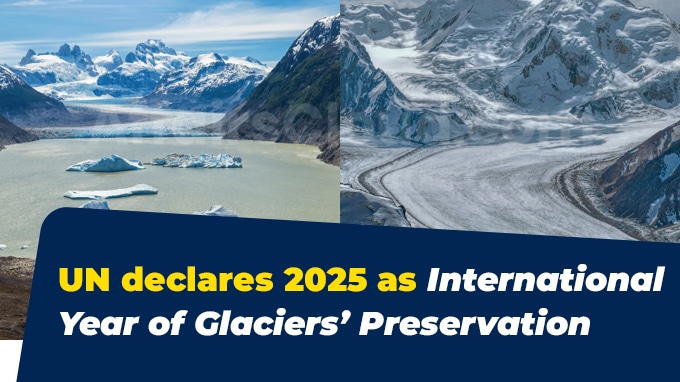 On January 21 2025, the United Nations Educational, Scientific and Cultural Organization (UNESCO) and the World Meteorological Organization (WMO) have jointly declared 2025 as International Year of Glaciers’ Preservation(IYGP) in Geneva(Switzerland), emphasizing the global urgency to safeguard glaciers, which are critical sources of freshwater for over 2 billion people worldwide.
On January 21 2025, the United Nations Educational, Scientific and Cultural Organization (UNESCO) and the World Meteorological Organization (WMO) have jointly declared 2025 as International Year of Glaciers’ Preservation(IYGP) in Geneva(Switzerland), emphasizing the global urgency to safeguard glaciers, which are critical sources of freshwater for over 2 billion people worldwide.
- This international year focuses to gain worldwide support, encourage research, and make cryosphere data more accessible, all with the goal of reducing the impacts of rapid glacier melting.
Note : UN weather experts from the WMO confirmed that 2024 was the hottest year on record, at 1.55 degrees Celsius (C) above pre-industrial temperatures.
Background:
i.The International Year of Glaciers’ Preservation 2025 (IYGP 2025) was established through resolution A/RES/77/158, adopted by the United Nations General Assembly (UNGA) during its 77th session in December 2022, with the leadership of UNESCO and the WMO.It was proposed by Republic of Tajikistan.
iii.It will coordinate international efforts supported by over 75 international organizations and 35 countries.
iv.The International Year of Glaciers’ Preservation (2025) and World Glacier Day (March 21) support Sustainable Development Goal (SDG) 6 by addressing the critical role glaciers play in water resources.
Highlights of the Event
i.The first World Glacier Day will be celebrated on March 21, 2025, aligning with World Water Day, observed annually on March 22.
- This annual observance aims to raise awareness about the significance of glaciers and the need for global collaboration to protect them.
ii.The UN has established a Trust Fund to support activities and initiatives focused on preserving glaciers.
- The resolution invites governments,inter-governmental and non-governmental organizations, major groups, other relevant stakeholders, and donors to voluntarily contribute to the trust fund in support of activities for glaciers’ preservation.
iii.An International Conference on Glacier Preservation will be held in Dushanbe, Tajikistan in May 2025.
About World Glacier Monitoring Service (WGMS)
- WGMS, at the University of Zurich in Switzerland, collects data on glacier changes (mass, volume, area, length) and ice distribution.It is service of IACS (International Association of Cryospheric Sciences), IUGG (International Union of Geodesy and Geophysics).
- It is a Part of World Data System (International Science Council) and works under UN Environment, UNESCO, and WMO.
About Earths Cryosphere
The cryosphere refers to all the frozen parts of the Earth, both on land and in the ocean. This includes snow, glaciers, ice sheets, ice shelves, icebergs, sea ice, lake and river ice, permafrost, seasonally frozen ground, and solid precipitation like snow.
i.The term comes from the Greek word krios, which means cold.
ii.More than 275,000 glaciers worldwide cover approximately 700,000 km². Glaciers and ice sheets store about 70% of the global freshwater.
iii.70% of Earth’s fresh water exists as snow or ice and around 10% of Earth’s land area is covered by glaciers or ice sheets.
iv.The Hindu Kush Himalayan(HKH) cryosphere is warming at twice the global average rate, according to the International Cryosphere Initiative.
Hindu Kush Himalayan cryosphere:-
- The Hindu Kush is an 800-kilometre(km)-long (500 mi) mountain range in Central and South Asia to the west of the Himalayas. It stretches from central and eastern Afghanistan into northwestern Pakistan and far southeastern Tajikistan.
- The HKH is located in Afghanistan, Bangladesh, Bhutan, China, India, Myanmar, Nepal, and Pakistan.
About World Meteorological Organization (WMO):
Secretary General – Professor Celeste Saulo
Founded –1950
Headquarters – Geneva, Switzerland
Parent Organization – United Nations (UN)




